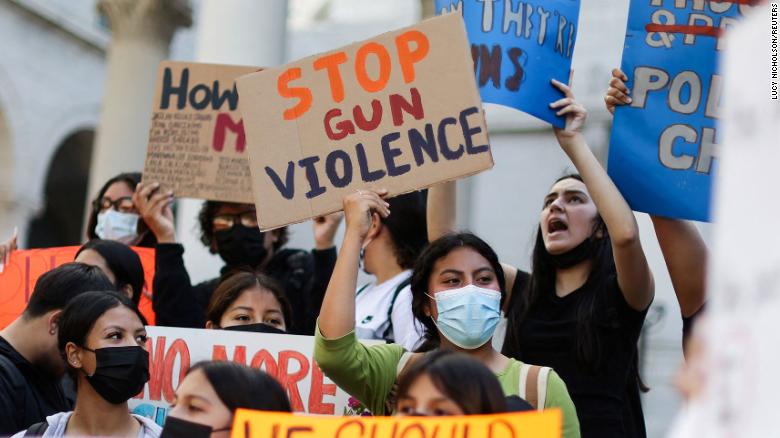Gregory Jackson is intimately familiar with gun violence.
He said that while he was walking along N Street in the Shaw neighborhood of Washington, DC, about nine years ago, he was shot in his right leg by a man who mistook Jackson for someone else.
The experience forever changed Jackson. At the time, he was the southern regional director of Organizing for Action, a group that championed then-President Barack Obama’s agenda. Jackson recalled how the police interrogated him in his hospital bed. They treated him, a Black man, not as a victim but instead like a perpetrator — like a security risk to be monitored.
It took him six months to learn to walk again.
Jackson is now the executive director of the nonprofit organization the Community Justice Action Fund, and his passion for gun violence prevention feels even more salient today.
Gun control legislation remains minimal at the federal level, though, crucially, just last month, President Joe Biden signed into law the Bipartisan Safer Communities Act, the first significant federal gun safety legislation passed in nearly 30 years. Meanwhile, some Democratic-controlled state legislatures are designing laws to confront the recent spike in gun violence. However, some observers worry about the potential unintended consequences of such laws, which have at times in the past contributed to mass incarceration and disproportionately harmed Black Americans.
“There’s definitely a tension between our biased criminal legal system and some of the sentencing-focused policies we’ve seen implemented over the years,” Jackson told AWN. “That’s why we’re pushing for a public-health response to gun violence, which means that it should be people centered and resource driven, not necessarily about carceral strategies or restrictive policies.”
In short, he wants policing to play a smaller role in gun control.
Jackson added that he has little interest in directing resentment toward the man who shot him.
“What I have more resentment for is, How did that individual gain access to the firearm? Why is it so easy for people in my community to get a gun? It’s easier to get a gun in my neighborhood than it is to get a library book or a healthy meal,” Jackson said.
There’s no easy way to curb gun violence. But experts say that “cleaning up policing” and shrinking our reliance on the criminal justice system are important pieces of the puzzle.
‘We’ve got to clean up policing’
The issue when it comes to gun control isn’t necessarily the law, according to Carol Anderson, an African American studies professor at Emory University. Sometimes, the issue is the enforcement of the law.
“Let’s go back to the Bruen decision in New York, that horrible decision by the US Supreme Court,” Anderson said, referring to the high court’s ruling in June that struck down a century-old New York gun law and that observers suspect will unleash a wave of lawsuits seeking to loosen restrictions at the state and federal levels. “The amicus curiae brief from public defenders said, The NYPD has used this law to go after Black folks. Look at what this has done.”
Anderson, the author of “The Second: Race and Guns in a Fatally Unequal America,” said that, at the core, the problem was policing.
“That’s the component I don’t think is understood well enough,” she said. “We’ve got to clean up policing. Until we take anti-Blackness seriously, we’re going to keep dancing around the issue.”
Following the Bruen decision, New York Democratic Gov. Kathy Hochul signed a law limiting the concealed carry of firearms in locations such as schools. Yet some observers have expressed concern that the new law, though certainly well meaning, might nourish age-old biases.
“Instead of going after manufacturers, all those other sort of top-level issues, continuing to focus on individual possession cases where the police are in charge of that enforcement just ensures that we’re going to continue to see the over-criminalization of Black and brown New Yorkers,” the civil rights attorney MK Kaishian recently told City & State.
Sharone Mitchell Jr., the chief public defender of Cook County, Illinois, a state with comparatively rigid gun control laws, echoed some of Kaishian’s sentiments.
“What we’re seeing is an influx of possession cases, and these arrests are happening in very specific neighborhoods, mainly through stops of cars and seizures in searches of cars,” Mitchell told AWN, stressing that “the reality of the situation is the way we’re pursuing gun laws that haven’t affected the supply of or demand for guns.”
He also noted that his view puts him in an uncomfortable position, because he’s “not a gun person” and doesn’t own a gun.
Like Anderson and Kaishian, Mitchell pointed out the challenge that policing can pose.
“What we’re seeing is the police saying, Listen, if we can’t stop gun violence, then we just need to arrest as many people as possible and hope that that has some type of effect,” Mitchell said. “Also, there are PR benefits to being able to say, We pulled 14,000 guns off the street, without giving the denominator. There are hundreds of thousands of guns on the street.”
